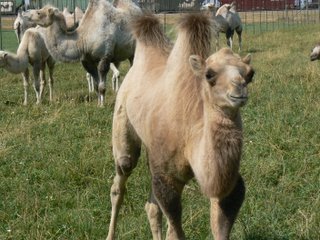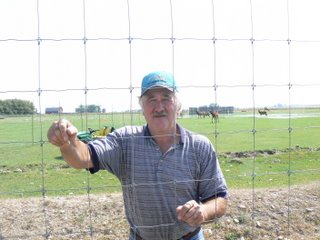Were Those Camels We Just Passed?


As Donnie and I drove south from the ranch, we passed a curious site on the side of the road in Fairfield, Montana. A series of pens held a gaggle of double-humped camels. A second pen held elk, and in the far corner, a solitary and huge bull camel. We saw a man cutting grass and we stopped to talk.
“I got my start when Dennis Weaver bought 44 llamas from me, in 1988,” said Al Deutsch, the owner of Al’s Bactrian Camels. “Come on around,
and I’ll show you some more pictures.” We entered his compound and said hello to the friendly herd of about 26 large and small white and brown camels. They had huge double humps, this is the species called Bactrians. Dromedaries have one hump but these guys, who approached us very easily, had lush coats and giant heads. His home was spacious and filled with photos of movie posters with his posed camels.
“I rent these out for movies and sell them to zoos all over the country,” said Al, who had a habit of dropping names of famous camel collectors that we had never heard of. “I breed these guys and I sell the little ones for $30,000 each. This is Big Time!”
I asked Al if his kids were interested in continuing his camel raising tradition, and if such good profits interested them. “Oh, no, no, they work in the oil fields, heck, one of my sons makes oh, $18,000 a month on an oil platform. Another is involved with a real estate website in British Columbia. Beautiful up there, just gorgeous.”
Al is a man of in his late 60s, and his luxurious house, spacious grounds and vehicles indicated that this is a very good business indeed. He explained some of the difficulties of breeding these beasts: The camel penis, for example, faces backwards, so it is very hard to successfully mate.
“Dennis Weaver, he was a heck of a guy, a real pal,” he said. “We raised llamas and were in business together at his ranch in Colorado.” His voice trailed off and his ebulliance switched to sadness. “I have a hole in my heart. This whole place, this business, this is what I’ve worked so hard to build up, and none of my sons want anything to do with it. They used to get up with me and work when they were young, but heck, now they are all moved away and just don’t care about this.”
He has a young camel breeding scion in New Zealand, he said. We hope that he finds someone to carry on his tradition, because it appears that the world needs Al’s Bactrian Camels.
